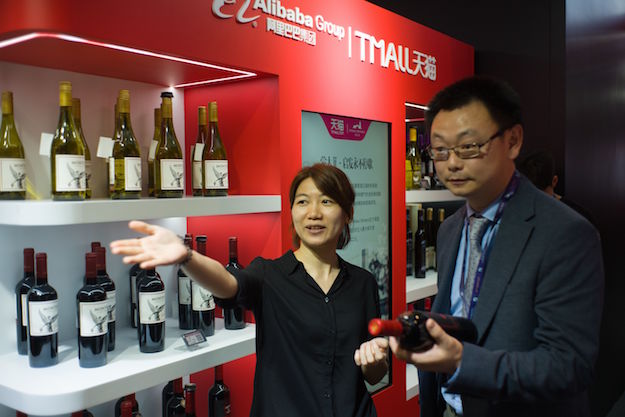Chinese appetite for online shopping has opened a wide new market for Latin American agricultural products: digital supermarkets. Multiple virtual grocery shops are making it easier for Latin American producers not only to sell their fruits and vegetables on the other side of the planet, but to understand, in real time, their Chinese customers’ tastes and preferences.
Shanghai resident Li Shasha orders beef from Uruguay, cherries from Chile, and the occasional bottle of Argentine Malbec right from her phone. The products are delivered to her doorstep in less than 30 minutes, just as she’s getting back home from work.
“It’s great to be able to buy fresh products from Argentina and Chile, and have them almost immediately, wherever I want,” she told AQ.
Shasha says that Latin American products “are well known for their high quality, which is my main concern when shopping for food.”
Changing demographics and rising income levels have led to a surge in China’s food imports, with overseas fruit purchases increasing 36% in 2018. With the help of technology and innovative business models, producers from Latin America are finding ways to better understand what Chinese consumers want and increase their sales.
Rise of the Online Supermarket
China has become the world’s largest and fastest-growing e-grocery market. Total sales, which were estimated at $51 billion in 2018, are projected to increase fourfold in the next five years (compare to $24 billion in the U.S. in 2018). A proliferation of online grocery platforms is making it extremely easy and affordable to purchase fresh food online in China. Alibaba, China’s largest e-grocery player, is affiliated with several e-grocery platforms including T-Mall, Hema and Yiguo, while rival retailers JD and Suning offer their own competing services. In addition to these large national players, there are numerous smaller platforms at regional and city levels.
Camposol, one of Peru’s leading fruit exporters, signed a strategic agreement with Alibaba, in May 2018. Under the partnership, Camposol sources from Peruvian growers to supply Alibaba with blueberries and avocados. The online sales channel is not just a source of revenue, but also a unique opportunity to access valuable point-of-sale data, such as consumer preferences, sales performance and inventory levels. This direct connection enabled by technology, linking both ends of the supply chain, allows producers to fine-tune their operations and meet customer demand.
In November 2018, trade promotion agency ProChile also signed agreements with several Chinese online retailers, including Alibaba and Suning, another major supermarket chain.
Chile’s success has been aided by Chinese consumers’ love for cherries — red is considered a lucky color, and in recent years, the fruit has become a highly prized gift for family and friends during Chinese New Year.
According to figures from Chile’s Office for Agricultural Research and Policy, Chilean cherry production has tripled over the past 10 years, with approximately 85% of output being exported to China. The country displaced Thailand in 2018 to become China’s largest source of fresh fruit imports, with sales of $1.7 billion and a market share of 24%. Peru and Ecuador were the next two largest Latin American suppliers, with shares of 3% and 2% respectively.
A smaller world
Back in Shanghai, over a glass of wine and some rib-eye steak, Shasha and her husband entertain the idea of traveling to South America to explore the region’s culture and cuisine.
“Now we are really curious to see where these products are coming from, and how they are made. [Online supermarkets] have really made the world smaller.”
As China’s middle class continues to grow and consumers increase their spending on imported food, demand for Latin American produce will likely continue to grow. Increased digitization of the food supply chain should in turn allow producers to better understand their Chinese consumers. Meanwhile, Chilean exporters are not wasting any time. In early March, the Chilean Fruit Exporters Association hosted a workshop in Guangzhou to promote what they hope will be the country’s next big success: Chilean Stone Fruit.
—
He Mu is a food and agriculture investment professional covering China and Latin America. Lucía Wei He is a reporter for RED/ACCIÓN and CNN Radio based in Buenos Aires.






